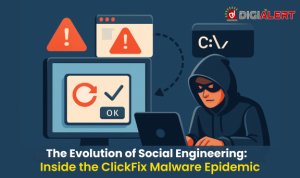Displaying items by tag: VinodSenthil
Cloud computing has revolutionized how businesses operate. From startups to global enterprises, the cloud powers innovation, agility, and scale. But what happens when that very infrastructure—trusted by millions—harbors a hidden vulnerability?
This is exactly what’s happening with ECScape, a newly discovered flaw in IBM Cloud’s Elastic Storage Server (ESS). If left unpatched, ECScape could allow attackers to access sensitive files and data—without even needing a password.
Did you know that over 60% of malware infections begin with a simple click?
The ClickFix malware campaign is a sobering reminder that cyberattacks no longer require sophisticated exploits or deep infiltration tactics—just one careless moment is all it takes. By exploiting trust in legitimate software updates, ClickFix is wreaking havoc across industries. As ransomware attacks have surged by 72% over the past year alone, this particular threat is putting businesses at risk like never before.
“AI is not just a tool anymore—it’s the backbone of modern enterprise. But what happens when that backbone has cracks?”
In the age of artificial intelligence, businesses worldwide are racing to adopt AI-powered tools to streamline operations, personalize user experiences, and stay ahead of the competition. But as adoption grows, so does the attack surface.
CL STA 0969 Malware: The Silent Threat Targeting Global Networks — Is Your Organization Prepared?
The Age of Silent Cyberattacks
In today’s interconnected digital landscape, cyber threats have grown more sophisticated, stealthier, and devastatingly effective. Among the most alarming developments in 2025 is the emergence of a covert malware strain known as CL STA 0969—a silent yet highly potent weapon in the hands of threat actors.
The Silent Threat Lurking Behind Microsoft OAuth Apps: Why Your Enterprise Might Already Be at Risk
In today’s hyper-connected digital landscape, where Microsoft 365 dominates business communications and document collaboration, a silent cyber threat is quietly gaining ground—malicious Microsoft OAuth applications. These threats aren’t loud or clumsy. They don’t rely on brute force or ransomware splash screens. Instead, they exploit trust. And in 2025, trust is a vulnerability many organizations haven’t learned to defend.
In a rare but significant victory for the cybersecurity community, a free decryptor has been released for the notorious FunkSec ransomware. This tool now enables affected organizations to recover their encrypted data without paying ransom, marking the end of a campaign that has so far claimed 172 known victims across the United States, India, and Brazil.
Another day, another headline-grabbing cyberattack.
This time, the victim is Toptal—a global leader in freelance software engineering, design, and finance talent. A reported 10GB of internal documents, proprietary code, and sensitive client communications were leaked after attackers gained access to the company’s private GitHub repositories.
Critical Flaws in Niagara Framework Expose Industrial Systems to Cyberattacks – Are You Prepared?
In today’s hyper-connected industrial landscape, the line between digital and physical infrastructure is thinner than ever. A small misconfiguration or unpatched vulnerability in a software system can lead to the shutdown of entire operations—be it a hospital’s HVAC system, a city’s water treatment plant, or a national power grid. One such alarming possibility has emerged with the discovery of multiple critical vulnerabilities in the Niagara Framework, a cornerstone of many industrial control systems (ICS) globally.
Imagine every confidential call in your company being silently intercepted. Not because someone left the door open, but because a trusted communications system—used by over 12 million businesses globally—has a dangerous vulnerability.
A newly uncovered critical security flaw in Mitel’s VoIP systems, tracked as CVE-2024-XXXX, has made this nightmare scenario a reality for organizations worldwide. The flaw allows attackers to bypass authentication and eavesdrop on voice communications, placing enterprises at risk of espionage, data breaches, and regulatory violations.
MIMO Threat Actor Targets Magento and WooCommerce Stores: Is Your E-Commerce Business Next?
Did you know over 1.3 million active e-commerce websites globally are powered by Magento and WooCommerce?
That’s a massive digital marketplace—and also a wide-open hunting ground for cybercriminals.
Recently, a sophisticated and stealthy cybercriminal group known as MIMO has emerged, launching targeted attacks on these popular platforms. Their primary aim? Injecting skimmers and fileless malware to steal sensitive customer payment data during checkout.
















